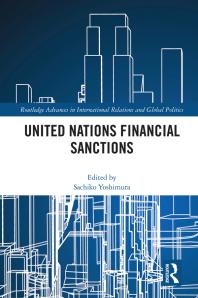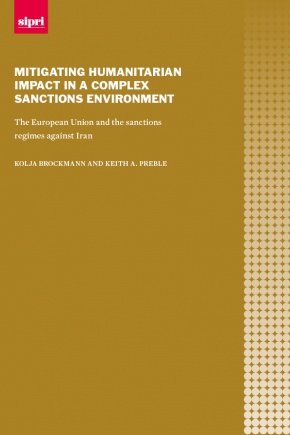The United Nations, the European Union and international security: EU and international sanctions
eBook
- United Nations financial sanctions
 / Ed. Sachiko Yoshimura (Kwansei Gakuin Univ., JP). Routledge, 2021, 233 pages.
/ Ed. Sachiko Yoshimura (Kwansei Gakuin Univ., JP). Routledge, 2021, 233 pages.
This book presents insightful perspectives on the invocation, implementation and application of UN-approved financial sanctions and related issues. With contributions from academics, diplomats and UN panel experts, Yoshimura offers an analysis of how the UN financial sanctions have evolved, the different roles of various major international actors in agreeing and deploying them, and their success in achieving desired outcomes.
eJournal article
- States, firms, and security: How private actors implement sanctions, lessons learned from the Netherlands
 / Francesco Giumelli (Univ. Groningen, NL), Michal Onderco (Erasmus University Rotterdam, NL). In: European journal of international security, 2021, Vol.6/2, p.190-209.
/ Francesco Giumelli (Univ. Groningen, NL), Michal Onderco (Erasmus University Rotterdam, NL). In: European journal of international security, 2021, Vol.6/2, p.190-209.
While the current practice of the United Nations Security Council, the European Union, and the United States leans towards imposing only targeted sanctions in most of the cases, private actors often complain about inability to process financial transactions, ship goods, or deliver services in countries where sanctions targets are located. The impact of sanctions often ends up being widespread and indiscriminate because sanctions are implemented by for-profit actors.
eJournal article
- The when, what, where and why of European Union sanctions
 / Francesco Giumelli, Fabian Hoffmann, Anna Książczaková (all from Univ. Groningen, NL). In: European Security, 2021, Volume 30/1.
/ Francesco Giumelli, Fabian Hoffmann, Anna Książczaková (all from Univ. Groningen, NL). In: European Security, 2021, Volume 30/1.
The decisions to impose sanctions on Russia and to lift them on Iran, in opposition to the wishes of the United States, contributed to the elevation of the profile of the European Union among the main global actors in international politics. However, the EU imposes sanctions since the spring of 1994, shortly after the entry into force of the Treaty of Maastricht. Even though the EU consequently has 26 years of experience herewith, EU sanctions have been mostly studied only on a case-by-case basis.
EU paper
 EU human rights sanctions: Towards a European Magnitsky Act
EU human rights sanctions: Towards a European Magnitsky Act
/ Martin Russell for EP Members' Research Service, 2020, 8 pages.
Sanctions are a key part of the EU's human rights toolbox. The EU adopts restrictive measures – mostly in the form of travel bans and asset freezes – against individuals and organisations responsible for some of the worst human rights violations. The United States' 2016 Global Magnitsky Act, named after Sergey Magnitsky, a Russian whistleblower who died in jail after exposing corruption by high-level officials, gives some idea of how future EU human rights sanctions will work.
See also a briefing An EU human rights sanctions regime, EP, 2019.
EU paper
 Foreign Affairs Council, Dec. 2020, overview paper. Press release EU adopts a global human rights sanctions regime.
Foreign Affairs Council, Dec. 2020, overview paper. Press release EU adopts a global human rights sanctions regime.
“A few days ahead of the International Human Rights Day on 10 December, the Council adopted a decision and a regulation establishing a global human rights sanctions regime that will allow the EU to target individuals, entities and bodies responsible for, involved in or associated with serious human rights violations and abuses worldwide, no matter where they occurred.”
EU paper
- The EU’s chemical weapons sanctions regime: Upholding a taboo under attack
 / Clara Portela, Erica Moret (Graduate Institute of International and Development Studies) for European Union Institute for Security Studies (EUISS), 2020, 8 pages.
/ Clara Portela, Erica Moret (Graduate Institute of International and Development Studies) for European Union Institute for Security Studies (EUISS), 2020, 8 pages.
The prohibition against the use of chemical weapons, firmly established in the Chemical Weapons Convention, has been repeatedly breached in the Syrian civil war. After a poisoning using a nerve agent was attempted in Salisbury in 2018, concerns about the erosion of the ‘taboo’ on chemical weapons use deepened.
See also a briefing A blacklist is (almost) born: Building a resilient EU human rights sanctions regime / Clara Portela for EUISS, 2020, 8 pages.
EU paper
- Iceberg ahead! Rethinking conflict prevention
 / Giovanni Faleg, Florence Gaub for European Union Institute for Security Studies (EUISS), 2019, 8 pages.
/ Giovanni Faleg, Florence Gaub for European Union Institute for Security Studies (EUISS), 2019, 8 pages.
As the Secretary General of the United Nations Antonio Guterres pointed out in his first speech in office in 2017, “We spend far more time and resources responding to crises rather than preventing them. People are paying too high a price (…) We need a whole new approach”.
Think Tank paper
- Mitigating humanitarian impact in a complex sanctions environment: The European Union and the sanctions regimes against Iran
 / Keith A. Preble, Kolja Brockmann for SIPRI, 2021, 36 pages.
/ Keith A. Preble, Kolja Brockmann for SIPRI, 2021, 36 pages.
The combination of sanctions on Iran imposed by the USA, the UN and the EU in response to, among others, nuclear and ballistic missile activities and human rights violations provides for a sanctions environment that is highly complex and difficult to navigate for exporters, financial institutions and humanitarian actors … The focus of this paper is on the array of overlapping sanctions and the mitigation of humanitarian impact, with a particular focus on EU sanctions policy and instruments.
See also on same topic: European non-proliferation diplomacy in the shadow of secondary sanctions / Tytti Erästö, SIPRI, 2020, 8 pages.
Think Tank paper
- What EU sanctions policy can learn from European mutual defence
 / Clara Sophie Cramer for European Council on Foreign Relations, 2021, 3 pages.
/ Clara Sophie Cramer for European Council on Foreign Relations, 2021, 3 pages.
EU sanctions policy could imitate the coalition-building mechanism of Article 42.7 – the EU’s mutual defence clause – in response to gross violations of sovereignty through economic coercion.
Website
- EU Sanctions Map
 The EU Sanctions Map was created by the Estonian Presidency of the Council of the EU and was launched on 29 September 2017. The EU Sanctions Map provides information on sanctions that are agreed by the EU Member States and adopted by the EU Council and by the European Commission. It also covers sanctions regimes that are imposed by the United Nations Security Council and implemented by the EU Council and by the Commission.
The EU Sanctions Map was created by the Estonian Presidency of the Council of the EU and was launched on 29 September 2017. The EU Sanctions Map provides information on sanctions that are agreed by the EU Member States and adopted by the EU Council and by the European Commission. It also covers sanctions regimes that are imposed by the United Nations Security Council and implemented by the EU Council and by the Commission.
- Last Updated: Jul 12, 2023 2:42 PM
- URL: https://ec-europa-eu.libguides.com/EU-and-UN
- Print Page
